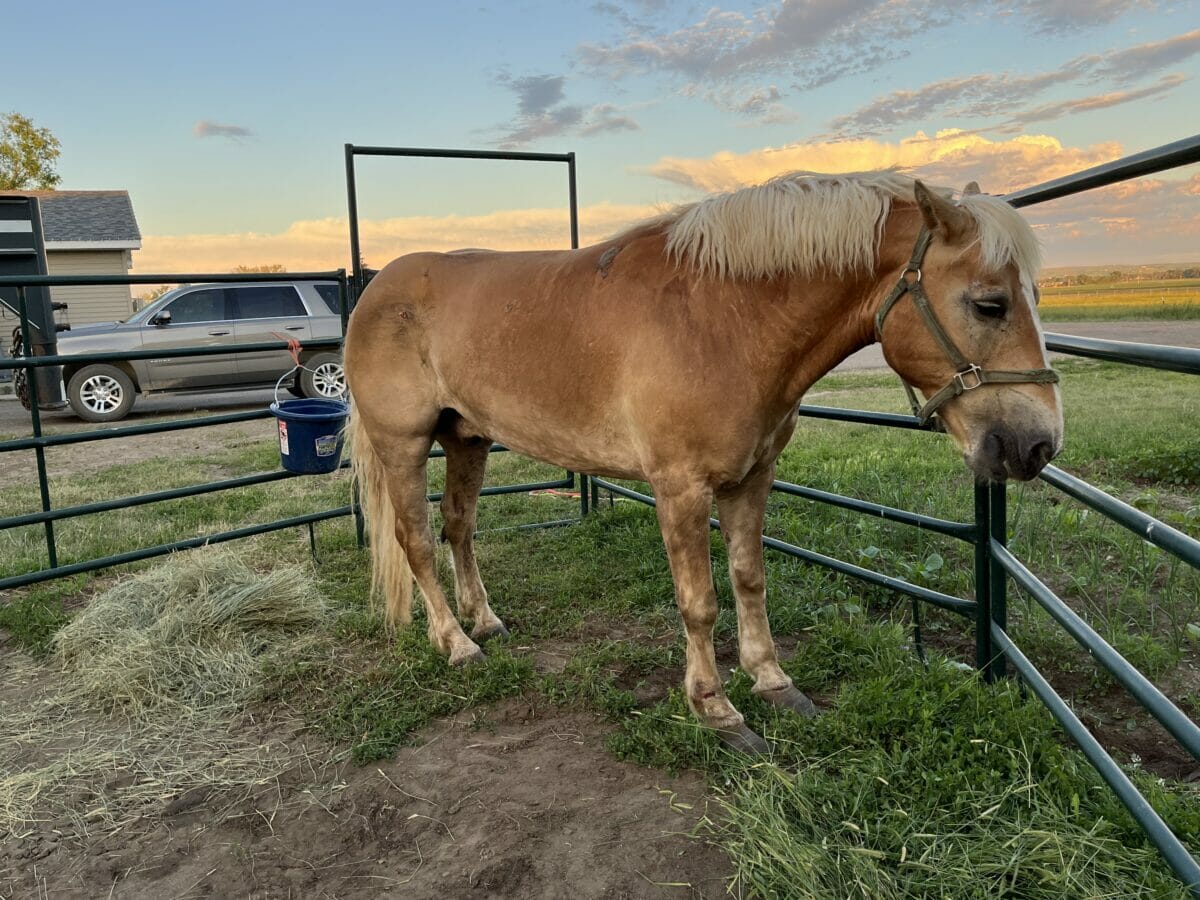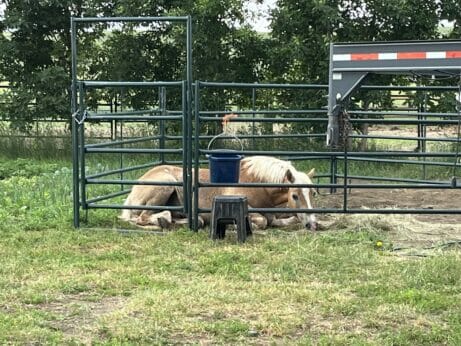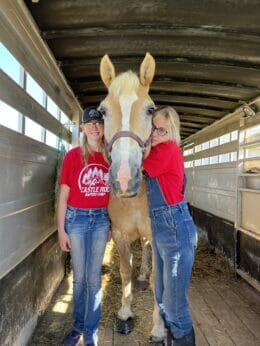As the number of equines getting sent across US borders for slaughter continues to drop, horse traders have found a lucrative new income stream that’s just as abusive.

Crystal Kraft first saw Nacho, a sturdy golden chestnut Halfinger with a flaxen mane, on Fountain Hill Horses Facebook page. The post stated that the Haflinger, a breed known for its laid-back, people-pleasing temperament, would be sent to a Mexican slaughterhouse if no one paid the $2,500 “bail.” Anyone who paid could buy him out of that grisly destiny.
Kraft, who runs a small chicken farm in Richland County, Montana, sent the money on the last day. And it might have worked out fine, as it has with other horses she has purchased after having only seen them online. But Nacho was coming to her via a vast network of greedy horse traders who prey on good-hearted people who want to give these equines a better life—and the sellers who oftentimes think they are sending their companions to loving new homes.
A couple of days after they sent the money, Kraft and her husband were surprised to hear frantic banging on their door. The transporters who picked up Nacho told them the horse was in such bad shape when they got him that they rushed to Montana from the facility in Arkansas as fast as they could in fear the horse would go down in the trailer and not be able to get up. Nacho looked defeated, his head hanging low, old pressure sores on his bony hips, body propped against the side of the trailer to stay upright. “We were heartbroken and devastated,” says Kraft, who bought the horse for her daughters, who were 11 and 14 at the time. “The girls saw him come off and were bawling.”
They managed to get the horse out of the trailer. He quickly went down and didn’t get up for 12 hours. The family medicated him and checked to see if his legs could still move. Kraft’s farrier—a specialist in equine hoof care—came out a few days later. When he touched the sole of Nacho’s hoof with his rasp, it immediately bled. The soft tissue in his hoof was so inflamed, a condition known as laminitis or founder, that his coffin bone had rotated all the way down to the sole. An intense fight to save Nacho’s life began.
Fountain Hill claims to be “helping horses who are actually in immediate danger.” In fact, according to experts, Kraft is one of countless animal lovers before her to get sucked into a scam that not only doesn’t save horses from slaughter but actually pulls more horses into a cruel corner of the horse-trading world. These traders claim to offer animal lovers a chance to save horses from so-called “kill pens.” But they are endangering them throughout the entire process.
“Once they get into the auction/slaughter pipeline, so much of the callousness and cruelty starts there with no vet care and misrepresenting the horses to be rideable, healthy and young—anything to sell them,” says Wendy Thomson, the administrator of multiple social media pages to document and warn about kill pens. “Many times people have been sent horses straight out of the kill pens having strangles, salmonella and other diseases, basically on death’s door.”

After arriving at Crystal Kraft’s home, Nacho went down and didn’t get up for 12 hours. (Photo courtesy of Crystal Kraft)
The problem is so widespread that the American Horse Council released a statement on the scams: “These ‘bail-out’ or ‘ransom’ operations are run in conjunction with feedlot operators who buy animals at low market prices. These order brokers then post the animals on social media platforms with exaggerated price tags and an arbitrary deadline implying a day of shipment across an international border where the horses will be processed for human consumption.”
Slaughtering horses for their meat has essentially been banned in the United States since 2007 and some states have even banned the transportation of equines for slaughter. The number of horses getting shipped across the borders for slaughter has been dropping substantially over the past decade, from 148,848 in 2014 to 20,933 last year—a nearly 50-percent decrease from 2020.
In the past month, two bills were reintroduced in the House and Senate that would stop these scams from happening. The Save America’s Forgotten Equines (SAFE) Act (S.2037/H.R.3475), which will be tacked onto the 2023 Farm Bill if successful, would permanently ban the slaughter of horses for human consumption in the United States and prohibit the export of horses for slaughter abroad.
Polls have found that 83 percent of Americans oppose the slaughter of US horses for human consumption. Yet, there are a number of equine industry organizations that are against the SAFE Act, including the American Quarter Horse Association, American Veterinary Medical Association, and the American Association of Equine Practitioners, which states that slaughter is a humane alternative to “a life of discomfort and pain, and possibly inadequate care or abandonment.”
The current system is not comfortable or painless. Investigations have found horses crammed together in trailers for more than 35 hours at a time with no food or water. And there’s no guaranteeing that the slaughter methods used are humane at all. “Half of these may be going to fairly decent export-approved abattoirs, but the other half are going to local abattoirs and being killed by punctilla, which is stabbing the horse in the back of the neck,” animal behavior expert Dr. Temple Grandin, a proponent of horse slaughter, told Horse Journals.
To prevent this from happening, United Horse Coalition created an Equine Resource Database with a list of resources for horse owners in need, from castration services and veterinary grants to hay banks and euthanasia programs and clinics. “A lot of these horses are coming from situations where it has nothing to do with the horse and everything to do with the owner’s life circumstance, like losing a job or declining health,” says UHC director Ashley Harkins. “We want to head it off at the pass, so horses don’t end up at auction.”
It’s hard to know exactly where Nacho came from before arriving at Fountain Hill. A horse flipper could’ve found him for sale in a Craigslist ad saying something like, “Hoping to find forever home where he will be given the attention deserved.” He could have been sent to local auction by his previous owners, then listed for several hundred dollars more later that same day. Or he could have been passed around from auction to auction and dealer to dealer, each one earning their cut, as the laminae in his hoof became increasingly inflamed and broke down.

“The girls saw him come off and were bawling,” says Kraft, who bought Nacho for her daughters. (Photo courtesy of Crystal Kraft)
In many cases, the threat of imminent slaughter is a lie.
Nacho shouldn’t have been eligible to transport to slaughter, according to USDA regulations, which require that the horse is able to bear wear on all four limbs and walk unassisted. Kraft’s vet and farrier told her that Nacho had been foundering at least a month before she got him and there was only a slim chance he would’ve been able to make it to the slaughterhouse standing up.
Jason Sexton, a horse dealer in Tennessee who does send horses to slaughter, says that most slaughter-bound horses are unrideable adults or far past their prime. He is disdainful of the dealers that inflate their prices and prey on buyers’ emotions with bail prices far higher than what a horse will fetch on the normal auction market. Around the time Nacho, who was calmly ridden in his sale video, was purchased for $2,500 last year, Sexton, who prices horses fairly, had advertised a beautiful but unbroke toffee-colored paint Quarterhorse for $850.
“It’s a scam,” Sexton told me by phone. “Very few even have a deal to ship to plants.”
Unlike many of those fake so-called kill pens, Fountain Hill actually does have connections to slaughter plants. The page is moderated by Loren Austin Stanley, who is married to Boots Stanley. The Stanley family is one of the most prolific slaughter horse exporters in the country.
They also have a track record of abuse. Boots pled guilty to charges of aggravated animal cruelty in April 2018 after posting a video of himself and a friend slitting a dog’s throat, killing it on Snapchat, for which he received no jail time. In 2016, his father Greg and cousin Michael were charged with battery for hitting an animal rights activist in the face with a wood board.
When Kraft found out who she had been dealing with, she was dismayed. She called the Stanleys seeking answers, but says she’s been ghosted for the past year.
For 22 days, the Kraft family cared for the horse that had been dumped at their door. They cut foam pads to cushion his feet every day. Kraft’s daughters spent their days showering him with affection, hoping that would give him the will to pull through. None of it was enough.
When they made the decision to euthanize Nacho and end his misery, Kraft was furious and heartbroken that her daughters were forced to watch the gentle animal they nursed suffer from the day they met him until the moment they put him down. “It’s not something I would wish on anyone,” she says. “I was so naive to the whole kill pen thing.”
A heart-felt thank you to these wonderful souls who filled Nacho’s last days with so much love and compassion.
I know this may be of extremely unpopular opinion and I am a horse owner myself but what about the option of reopening horse slaughter in the US? Shipping over the borders is beyond inhumane and for some horses humane slaughter would save them from immeasurable suffering.
Please, call your federal legislators to ask for their support for the SAFE bill. This needs to be signed into law. If you don’t know any of your legislators’ phone numbers, google it. If they have a local office near you, drop in. Tell them, you’d like to know where your Senator or representative stands on the SAFE bill, and either thank them for their support, or ask that they take another look at the way these predators are preying on people, robbing many of money and causing heartache. The sellers are using false advertising, supposedly selling healthy horses to… Read more »
thank-you for the truth about horse auction / slaughter shipping.
Closer to 86% decrease, not 50%. Then there are the horses bailed but none of those persons have a home so the horse is given to someone who says they’ll take him, but they can’t afford transport etc so funds are raised for the transport. Then 30 days later, horse is being flipped and for sale again or ends up dead in a pit at a fake rescue because they couldn’t afford that many.
I have two kill pen pulled horses. Pulling from the kill pen is not for the faint of heart. You have to go into it fully expecting these are broken horses physically and/or mentally. I did not care that I gave money to whatever thief, scammer, what have you, that I purchased Griffy and Elsa from. What I cared about was Griffy and Elsa. Two living, feeling horses and getting them out of the hell they were living, only to be sent to be stabbed repeatedly until their spine broke, or stunned only to possibly regain consciousness while being hung.… Read more »
Thank you for sharing your story. I’m so sorry this happened but I’m glad Nacho was treated with love and kindness at the end of his life. I hope others learn from your story. The most important thing you and others can do is call or email your members of U.S. Congress and ask them to cosponsor The Save America’s Forgotten Equines (SAFE) Act (S.2037/H.R.3475), which will be tacked onto the 2023 Farm Bill if successful, would permanently ban the slaughter of horses for human consumption in the United States and prohibit the export of horses for slaughter abroad.
Accurate
There is no logical rationale for not eating horses. If one eats animal flesh, they eat animal flesh; there is no difference. The best solution is to not raise animals for food. But since that is the fact now, why separate any animals out of that food market?
It is heartbreaking reading this.